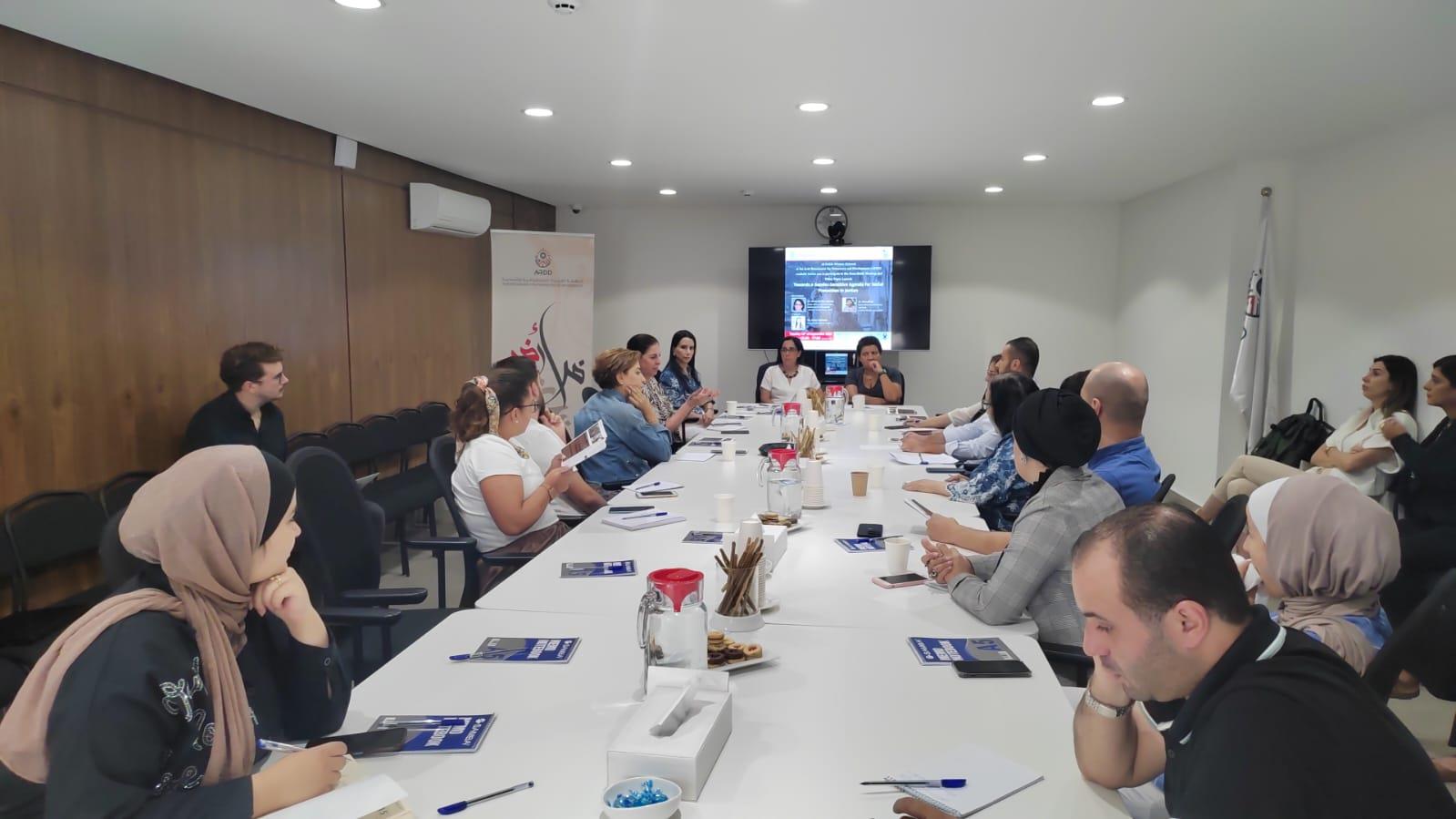Women around the world, and Jordan in particular, continue to face escalating risks in many cases. Such as limited access to education, lack of health services and coverage, discrimination between women and men, unpaid care work, high poverty rates, and increased vulnerabilities as they age due to the absence of adequate and appropriate social protection systems.
In light of this, and for a deeper and greater understanding of the needs of Jordanian women and girls, and the extent of the effectiveness of social protection programs in mitigating and addressing these risks, the Renaissance Women’s Network at the Arab Renaissance Organization for Democracy and Development (ARDD) held a roundtable meeting and launched the Policy Memo: Towards a Gender-Sensitive Agenda for Social Protection in Jordan, Tuesday, September 12, 2023.
The meeting, moderated by the Executive Director of the Arab Renaissance for Democracy and Development (ARDD(, Samar Muhareb, witnessed the launch of a policy memo on social protection systems in Jordan, including social security, legal frameworks, aid and zakat funds, health care, and the challenges that accompanied Covid-19 and other issues within the framework of the inclusive social protection theme at the Al-Nahda Thought Center.
According to Muhareb, “During COVID-19, the social protection file received widespread attention among governmental, civil, and human rights circles to find out the most successful ways to confront the crises and their repercussions, as the response at the time was varied in various countries of the region,” stressing that the social protection system and improving its quality are required.” In times of peace and war.”
Muhareb highlighted the priority of the social protection file and its importance for women, calling for an open dialogue between all stakeholders towards inclusive social protection, in order to transform current work models from poverty alleviation or relief mechanisms based on charitable work, to real social protection mechanisms based on rights and including all individuals in the Kingdom.
For her part, Dr. Mar Logrono, senior advisor for access to justice and inclusive social protection at the Al-NahdaThought Center, pointed out many issues facing Jordanian women, from the nationality law and social security, and the lack of laws specifically for breastfeeding, stressing that social protection must be comprehensive for all age stages from birth to death.
Dr. Logrono called for the need to put women at the center of social protection planning and reforms. This is particularly important at this time as social protection systems in Jordan and the region are receiving much attention. According to Dr. Logrono: women and girls are the most affected groups, noting that only 26% of working women around the world are registered with Social Security. She considered that the time has come to provide security and benefits for women not only for women in the formal labor market but also for those in the informal sector and out of the labor market taking care of their children and family members. Universal maternity pensions and universal old-age pensions are measures that can ensure minimum income security at times when women need them most.
Dr. Sanaa Al-Jelassi senior advisor for gender justice and youth at the Nahda Intellectual Center, noted the lack of information and numbers regarding the social protection file for women.
During COVID-19, women were fully responsible for providing care for their families, according to Al-Jelassi, who stressed the necessity of periodically reviewing social protection systems in the Arab region to ensure that they reach everyone equally.
Al-Jelassi pointed out that the lack of accountability greatly affects the quality of the systems surrounding women. She also stressed the importance of finding mechanisms to ensure women’s access to the labor market in an easier and more flexible way and to fill gaps, especially after marriage or childbirth. In her opinion, “There can be no talk of social justice without achieving justice between men and women and protecting the least favored groups.”
Social protection in general is “a set of policies and programs that aim to eliminate poverty, vulnerability and social exclusion, or to protect all people from these throughout their lives”, In this context The Policy Memo proposes moving away from narrow social protection approaches and methods by Include basic transfers in a broader package of social and economic policies with the aim of creating more and better jobs for women and reducing and redistributing the burden of unpaid care and housework.
As well as building on programs aimed at creating comprehensive plans that will prevent exclusion and stigma, especially for women from poor and marginalized groups, as well as avoiding restricting cash transfers with conditions that increase the burden of unpaid care borne by women and incorporating elements that respond to considerations of justice between men and women such as accessible care facilities for children, the elderly, and people with disabilities (whose care is mostly the responsibility of women of working age).
The Policy Memo also recommended ensuring the implementation of gender-sensitive processes and called for effective monitoring and complaints mechanisms, including participatory social audits and assessments including women organizations aiming at analyzing the factors that drive women’s exclusion and disadvantage in existing social protection schemes.
For more on the Policy Memo that looks into which extent the social protection agenda in Jordan takes into account gender sensitivities in its schemes: press here


